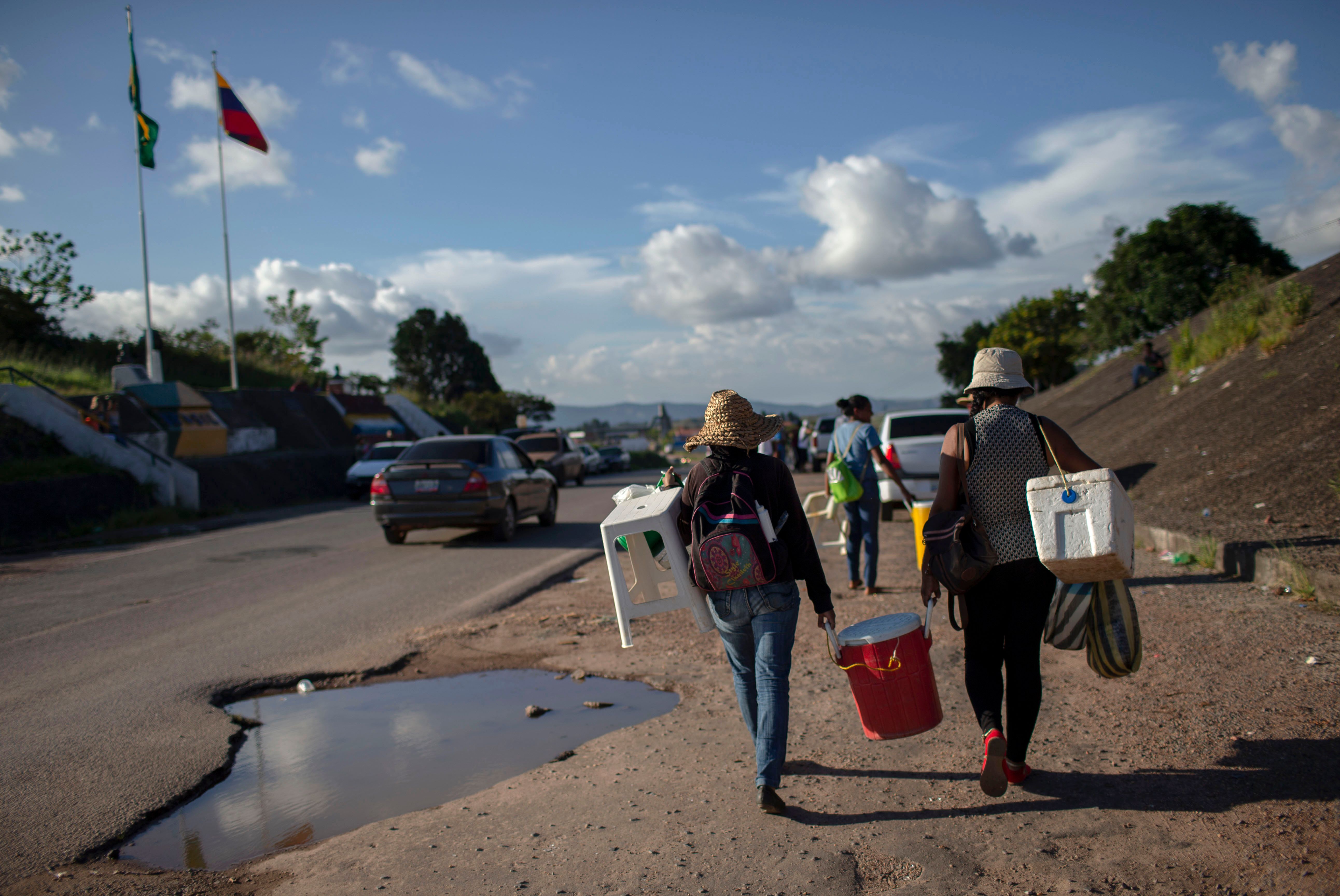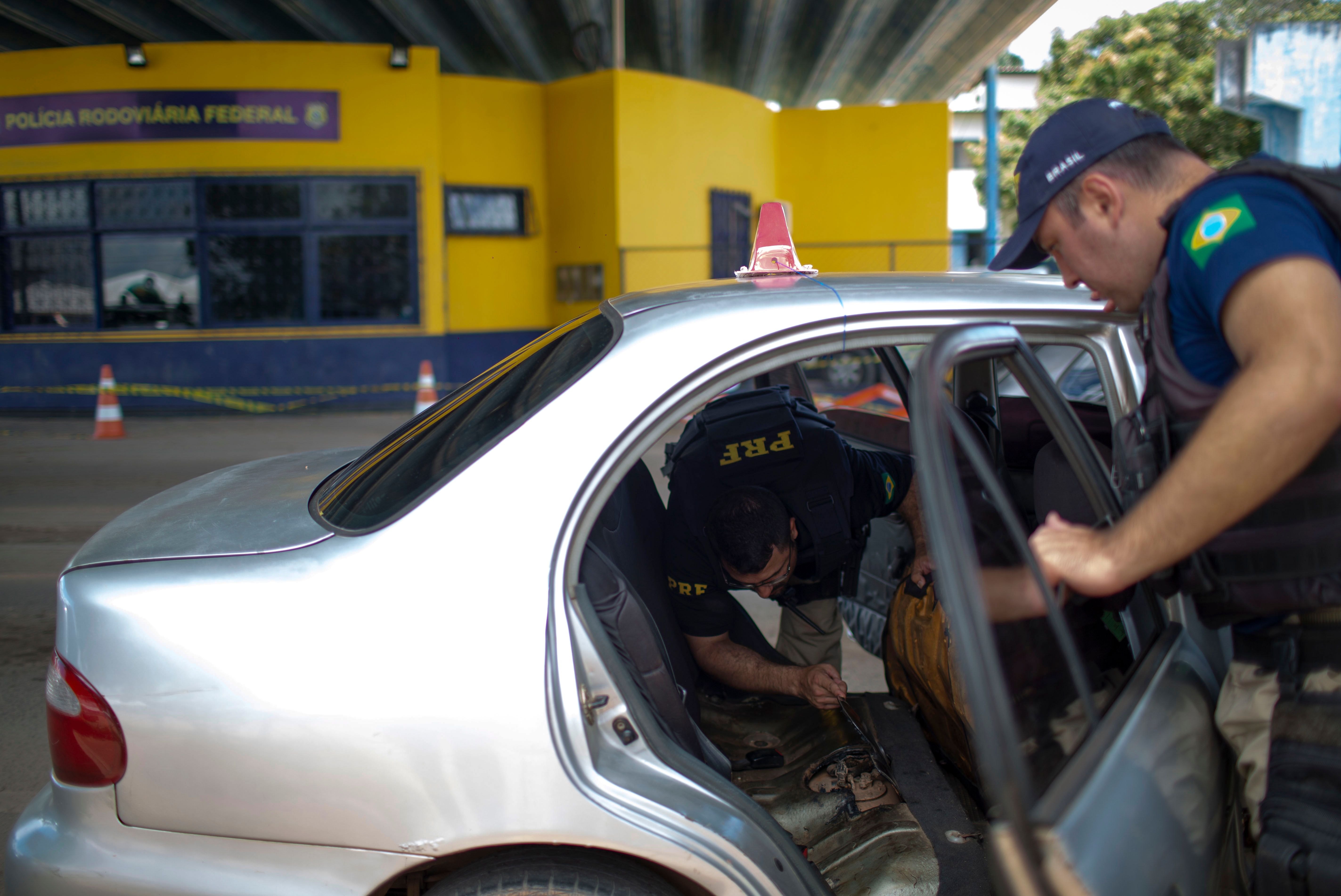A plaza was no place for a child to sleep. No water or toilets. Trash piling up, drawing vermin from the shadows. People falling ill: measles and malaria, malnutrition and pneumonia. But it was here or the street, so 25 children called Simón Bolívar Plaza home. The ones old enough to work went looking for money. God willing, the littlest ones would remember nothing. A one-year-old. An eight-month-old. A seven-month-old. A two-month-old. Their mothers did their best to keep flies clear of their mouths.
Some of the families had been camping here, in Boa Vista, Brazil, for six months. Boa Vista is an overgrown trading post on the Roraima savanna, between the jungle of Venezuela and the jungle of Brazil. Fifty years ago, this town was barely on the map. The borderlands were Yanomami territory, remote forests dotted with communal roundhouses where tribes shared hammocks and a hearth. Then came the wildcat gold miners. Then came the airstrips. Nowadays, the currency exchanges prefer gold and US$100 bills. Venezuelan dollars, bolivares, blow across the streets like dried leaves. Cocaine, hand grenades, and women are the only things of value crossing the border anymore. In March of 2018, a smuggler had been caught in the airport with more than a million dollars’ worth of gold bars strapped to his chest.
Back in Caracas, Venezuela, an egg yolk was as good as gold. People were fleeing by the hundreds of thousands, at first to Colombia, then increasingly to Brazil. One day of work in Boa Vista was worth a month’s salary in Venezuela. Word spread. Now there were 50,000 Venezuelans in Roraima, more than 10 percent of the Brazilian state’s population. Six times as many were seeking asylum here than the year before. Newcomers arrived every day by car, bus, or bicycle. Others walked the whole way, as if magnetized to the monument of Bolívar near the bus station and the children’s hospital.

With so many people looking for work, there was little to do for money anymore but to pace the lanes of stalled traffic, selling anything you could afford to buy, trying to catch the eyes of fatigued drivers. By midday, the vendors wobbled heat-struck through the rows of cars, offering candy or window washes, holding their bellies to beg for mercy. When the lights turned green, they returned to their places on the road’s shoulder, still as stones in the shade.
Fruit-truck drivers began avoiding the crowds of beggars. People complained about the herds of Venezuelans staggering like The Walking Dead. In February, a drifter from Guyana threw firebombs at two shelters, complaining that Venezuelans had stolen his bike. Passing drivers hurled rocks from their windows. In March, a mob surrounded the plaza. They shouted at the Venezuelans: “Go home!” Brazil had its own problems. The governor called for the border to be closed. The president arrived during Carnival—when nobody would notice—to announce an emergency plan. The army would undertake a humanitarian operation. The United Nations would build camps.
By then the plaza was dangerous, brimming with tents, makeshift lean-tos built from Snow White bath towels, beds made of cardboard boxes. One afternoon, a car swerved on the roundabout, lost control, jumped the curb, and careened into the camp. Nobody was killed, but it was one more reason for the city to crack down. Within a single day, the national guard surrounded the plaza with a plywood barrier, concealing the camp and all its waste. One way in, one way out. Authorities could control the foot traffic, keep the camp from mushrooming ever larger.

(Photo: Mauro Pimentel/AFP/Getty Images)
They kept coming. From El Tigre. From Maturín. From Puerto del Valle. From Ciudad Bolívar. They whispered with the paranoia of hunger. Are the Brazilians slowing down the process on purpose? Are they using the crisis for political ends? Are they trying to make it worse here than back home? If so, they had a long way to go. Back home, a month’s salary couldn’t buy a pack of cigarettes or a chicken or a kilo of rice. Even people with respectable credentials—teachers, petroleum engineers, AC technicians—had no choice but to leave home to feed their families. Girls wound up working the corners for food. Boys rested on the concrete, gazing at the glow of their cell phones, pictures of their girls back home.
Now and then, pick-up trucks with dark-tinted windows cruised the roundabout: foremen on the lookout for migrants to take back to the ranches and the mines. Sometimes the men and women who got in the trucks wouldn’t return for a week. Sometimes they would return a month later, dizzied and convulsing, likely from mercury exposure in the gold pits. Sometimes they never returned at all.

This evening, at sunset, the camp was hopeful the church volunteers would come bearing donations. These days the Christians only came two or three nights a week. When Désirée Fajardo Padron heard the familiar groan of the car reversing into the plaza entrance, the smile dropped from her face and she adopted the stern voice of the bus-fare collector she once was in Caracas.
“Hey, hey, back up!” Fajardo said. “Children first, children first.” Men accused women of using their children for extra rations. Women accused men of being cowards, trampling over children. When the plywood gate creaked open, the crowd rushed forward so urgently it seemed the entire barrier would collapse. Women kept their children aside. The national guardsman poked his head in and urged everyone to step back. Fajardo pushed in to facilitate the flow of rations.
The rations were minimal: a biscuit and a plastic cup of water. That was all the Christians had left to give anymore. Brazil had its own problems.
The Christians left. The crowd retreated from the gate. José Alberto Duarte-García, a 33-year-old from Caracas, slipped through the entrance on a bicycle, rapping about the corrupt police in Venezuela, a famous song he knew by heart.
El policia es malandro
Y el malandro es policia
Estamos atrapados
Aquí ya no hay salida
The cops are crooks
And the crooks are cops
We are trapped
There’s no way out
“These are the last days of the government of Nicolás Maduro,” Duarte-García, the father of a five-year-old and a seven-year-old waiting back home, said of Venezuela’s president. “I’ll be able to tell my children: Your father slept in Simón Bolívar Plaza. They will be able to tell their children.”

(Photo: Mauro Pimentel/AFP/Getty Images)
One day his children will tell their children that their grandfather took shelter under newspapers that declared it would get worse before it got better. When the rainy season came, there would be no shelter. When the plaza flooded, the only solace was that the disaster would urge the army to work faster. There were three U.N. shelters up and running already. Pregnant women first. Then women with children. Then people with disabilities.
Rumors had it that those shelters were like another country all their own. Showers. Fresh water. Three hot meals a day, served by military men in crisply pressed uniforms. White tents, neatly spaced, one family to a tent, measured equidistant to the meter.

In Jardim Floresta, the camp for pregnant women, a 20-year-old from Puerto La Cruz sits on a neatly swept concrete floor in the cool wind of an electric fan. Eight months pregnant, she takes selfies on her phone. “There was no food. No medicine, nothing,” she said of Venezuela. “A friend told me it was better in Brazil.”
Her mother is by her side, making sure her daughter is careful what she says to this gringo reporter. The mother was allowed into the camp because of her old, crooked foot—a birth defect, a lifelong misfortune that has suddenly become a saving grace. For now, they are safe. Fed. For now, her daughter waits patiently for the next kick from her baby, hungry and growing, her baby who will be born in another country, who will remember nothing of what it took to get here.





